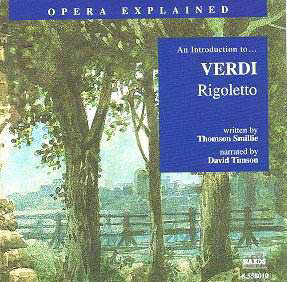Now how many ways are there to recycle an operatic
recording? You can produce a highlights CD or use arias or duets in
compilation derivatives. Naxos uses still another method. They commission
a writer and a narrator, tape the script and then edit it with a lot
of samples from their complete recordings. Honestly I’ve got my doubts
about the efficiency of the results as there are some severe handicaps.
The script writer can tell the story nice and clean but his musical
analysis has, by the nature of the enterprise, to limit itself to some
vague generalities. Take this Rigoletto. In ‘The Operas of Verdi - Volume
1’ Julian Budden draws the attention to the parallels between the courtiers
chorus ‘Scorrendo uniti’ and the witches chorus in Macbeth. Any
Verdi-conductor or scholar will immediately illustrate such an example
with a few measures on the piano but as this means an extra cost for
the recording firm and as they have not yet produced their own Macbeth
no such comparison is possible. Nobody can illustrate the many key changes
which reflect the changing mood of the jester in Rigoletto’s ‘Cortiginani
vil razza’ by just taking 30 seconds out of the recording without a
word of comment. Handicapped by the formula Thomson Smillie does a good
job in giving us the fine points of the story, though his Italian is
a little bit hazy. ‘Un ladrone’ is not a murderer but a robber and ‘anima’
means soul and not spirit. With all the hullabaloo of modern producers
on the theatrical values about Rigoletto, Mr. Smillie is surely
right to remind us time and again that Giuseppe Verdi was a genial tunesmith,
that lots of forgotten operas could be great theatre shows but they
are not redeemed by the embarrassment of melodic richness.
It’s in the historical introduction however that Mr.
Smillie is a little bit too much of our time. There he goes looking
for (and finds) clues in Verdi’s past that would probably surprise the
composer himself. The writer starts out on a very false note. "When
Verdi was born…" and then he tells us that Italy didn’t exist,
that part belonged to Austria, and other parts to the Pope and to the
Bourbons in Naples. Now every Verdi-lover knows that Giuseppe is not
the composer’s official first name. It is Joseph Fortuné as he
was born in the kingdom of Italy, a client state of Imperial France
while Bonaparte’s brother-in-law Joachim Murat ruled Naples and not
the Bourbons. The fragmentation came later after France’s defeat. Smillie
makes Verdi too much of a late 20th century artist saying
that he corresponds to the idea of the artist as provocateur because
of his permanent troubles with the censor. The writer forgets that every
opera-composer, even the most submissive ones, had difficulties with
that gentleman. Verdi knew very well how to make compromises and none
of his operas was ever outright forbidden as happened with Donizetti’s
Poliuto and Gaetano Donizetti is not exactly anyone’s idea of
a provocateur. "He chose Nabucco" is, according to
Mr. Smillie, proof of Verdi’s courageous attitude while it is well known
that the impresario Merelli who had been turned down by Otto Nicolai,
thrust the libretto in Verdi’s pocket and then threw him out of his
office. So the libretto chose Verdi. Mr. Smillie admires the cunning
of Verdi and his libretto-writer Francesco Piave who succeeded in practically
restoring all the action after the censor had flatly rejected the whole
opera. He forgets that censoring in those days (and even still now)
is a cattle market. The censor very well knows what he doesn’t want
(in this case a regicide on the scene) and therefore adds four or five
other offending facts so that in the end he can seemingly relent and
give the artists some kind of a break while reaching his aim all the
while. Mr. Smillie has not noted that one line of the original offending
situation stayed in the opera (nor does Budden) and that is Sparafucile’s
"Son Bourguignon" (I’m from Burgundy). A contract-killer from
Burgundy could easily live in the suburbs of Paris but wouldn’t have
gone unnoticed in Mantua whence the action of Rigoletto was redirected.
Narrator David Timson is a real pro with the right
(not-so-young) voice for this kind of enterprise. I’ve been a TV-producer
for twenty years and I wouldn’t hesitate a second in engaging Mr. Timson
for a voice-over.
Jan Neckers


